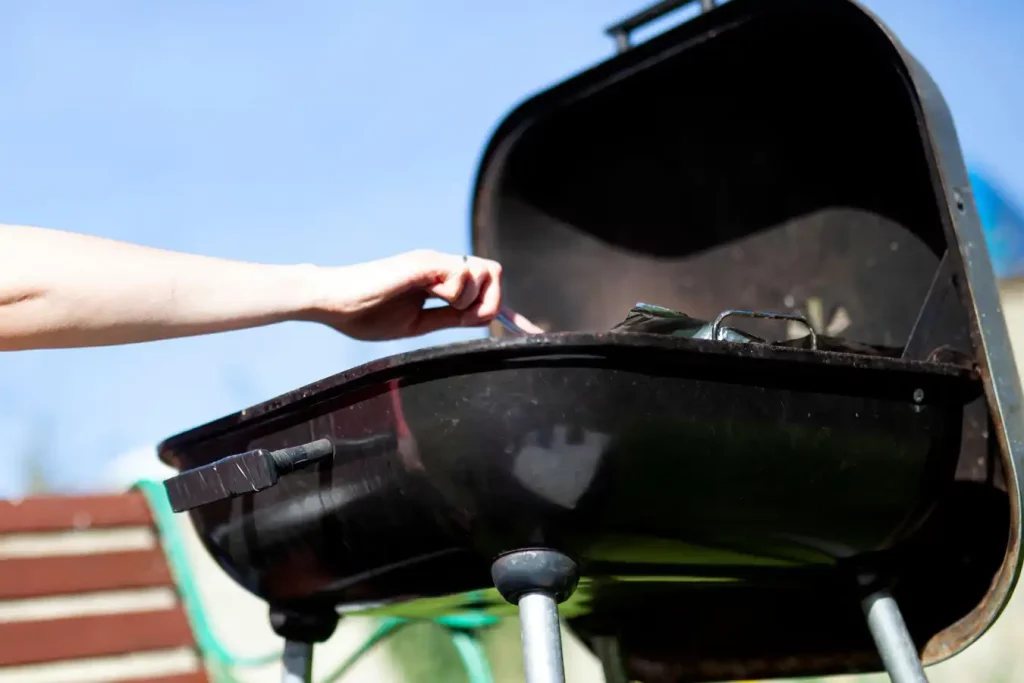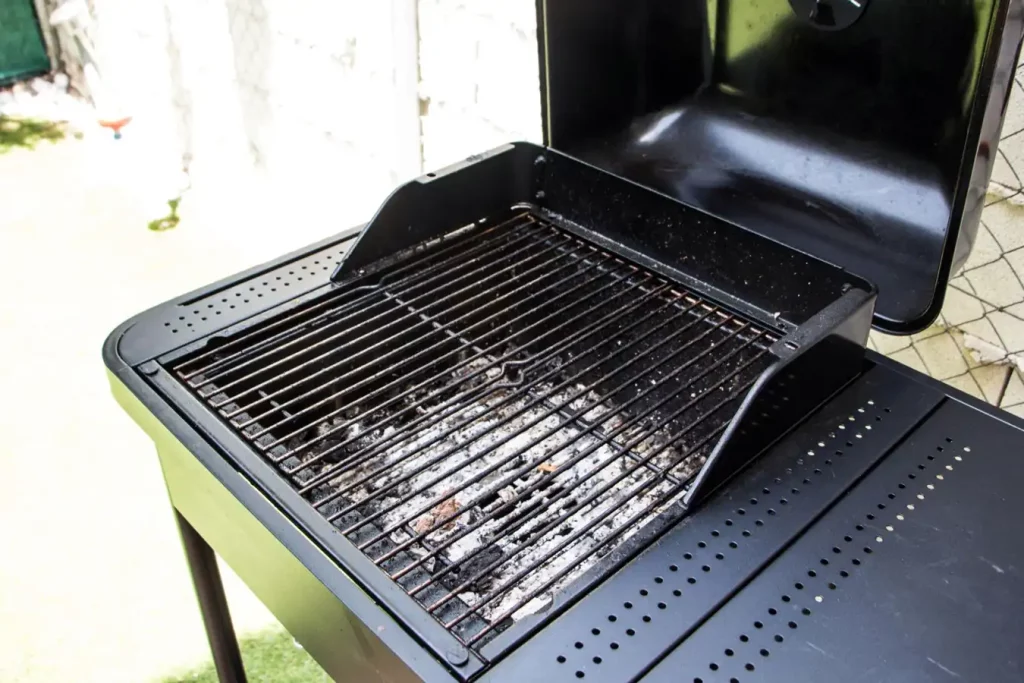Wondering how to season a new charcoal grill to elevate your camping cookouts?
You've come to the right place.
As a camping enthusiast with a knack for grilling, and I'm here to guide you.
This article aims to take your grilling skills to the next level, ensuring both robust flavors and extended grill longevity.
So get ready to turn your ordinary camping cuisine into an unforgettable smoky delight.
Understanding the Purpose of Season a New Charcoal Grill
Whether you're a seasoned pitmaster or a weekend warrior, the proper care of your charcoal grill is essential. And seasoning isn't just for your cast iron skillet—your grill needs that love, too. Before we dive into the “how,” let's understand the “what” and “why.”

What is Grill Seasoning?
No, grill seasoning isn't about sprinkling salt and pepper on your grill grates—though that would make for an amusing sight! In the grilling world, “seasoning” refers to a process that involves coating the grill grates with a layer of oil and then heating the grill. The heat then causes the oil to break down and bond to the metal, creating a hard, non-stick surface. It's a lot like creating that perfect crust on a cast iron skillet, but on a much larger scale!
Why Seasoning a Grill is Essential?
Just imagine this: you've marinated your favorite cut of steak overnight, the coals are perfectly hot, and you've just laid your steak on the grill, anticipating that sizzle. But instead, you're met with the gut-wrenching sound of your beloved steak sticking to the grill grates. Nightmare scenario, right? Well, seasoning prevents that.
Seasoning your charcoal grill serves three main purposes. First, it creates a non-stick surface that makes grilling and cleaning up much easier. Second, it protects the grill from rust, prolonging its lifespan. And finally, perhaps most importantly for us flavor chasers, it enhances the flavors of your food, adding that quintessential smoky, grilled flavor that we all crave.
Preparing for the Seasoning Process
Alright, friends, we're about to embark on a grilling journey that promises to enhance your barbecue experience and protect your investment in your grill. But, like any good adventure, we need to do a little prep work before we start. Let's talk about what you'll need and how to ensure you're seasoning your grill safely.
Gathering the Necessary Materials
First thing's first: let's gather everything we need. The beauty of seasoning a grill is that it doesn't require a lot of fancy equipment or materials. Here's your simple checklist:
- A Grill Brush or Steel Wool: You'll need this to give your grill grates a good cleaning before we start. Remember, cleanliness is key to a successful seasoning process.
- High Heat Cooking Oil: This is going to be our seasoning agent. Look for oils that have a high smoke point such as flaxseed oil, canola oil, or even vegetable shortening.
- Cloth or Paper Towels: We'll use these to apply the oil to the grates. Make sure you have enough on hand to cover the entire grill grate surface.
Alright, armed with these essentials, we're almost ready to fire up that grill. But, before we do, let's talk safety.
Safety Precautions before Starting
Seasoning a grill is not inherently dangerous, but remember, we're dealing with high heat and oil. It's crucial to take some precautions to ensure everything goes smoothly:
- Location: Make sure your grill is in a well-ventilated outdoor area, away from any flammable materials.
- Protective Clothing: Wear long sleeves and heat-resistant gloves to protect yourself from the heat and any splattering oil.
- Tools: Use long-handled tools to maintain a safe distance from the hot grill.
- Time: Don't rush the process. Ensure you have plenty of time to let the grill heat up and cool down properly.
With these tips in mind, you're ready to tackle the seasoning process. Remember, this is an investment in the longevity of your grill and the tastiness of your food.
Read more: How to Put Out a Charcoal Grill Without a Lid
Way to Season a New Charcoal Grill: A Step-by-Step Guide
Now that we're armed with the right knowledge, tools, and safety measures, it's time to dive into the step-by-step process of seasoning your grill. But, don't sweat it! I promise you it's easier than you think, and the payoff is immeasurable. The taste of your first burger, steak, or hotdog off your newly seasoned grill? Absolutely worth it. Let's jump in!
Step 1: Cleaning the Grill
To kick things off, we're going to start with a clean slate. Grab your grill brush or steel wool and give those grates a good scrub. We want to get rid of any rust, dust, or old food particles that might be clinging on. Clean grates mean a better surface for the oil to adhere to, and that's the end goal here. After scrubbing, take a damp cloth and wipe the grates down to ensure all loose particles are gone.
Step 2: Applying the Oil
After the grill grates are squeaky clean, it's time to get oily. Dab a cloth or a paper towel into your high-heat oil of choice. The goal here is to apply a thin, even layer of oil all over the grates. Make sure you cover every nook and cranny—this isn't a time for shortcuts! If you're worried about mess or safety, you can remove the grates to apply the oil, then place them back on the grill.
Step 3: Heating Your Charcoal Grill
Alright, with your grill grates glistening with oil, we're ready to crank up the heat. Light your charcoal and let the grill heat up. We're aiming for a temperature of about 400 degrees Fahrenheit (about 204 degrees Celsius). Why? Well, it's hot enough to make the oil ‘smoke', which is the process that helps the oil penetrate and form a protective coating on your grates. Make sure to close the lid for maximum effect.
Keep your grill at this temperature for about 30-40 minutes, then turn off the heat and let it cool down naturally. Remember, patience is a virtue here!
Step 4: Repeating the Process (if necessary)
One round of seasoning is great, but two or even three can really build up a good layer of protection. If you have the time, feel free to repeat the oiling and heating process a couple of more times. The result will be grates that are super non-stick and ready for some serious grilling action.
There you have it! Your step-by-step guide to seasoning a charcoal grill. Remember, this isn't a one-and-done deal. Make sure to maintain your grates by cleaning them after each use and re-seasoning them as necessary.
After the Seasoning Process
You've done it! You've successfully seasoned your grill, and it's now ready to deliver some spectacular culinary experiences. But remember, after-care is just as important as the seasoning process itself. From cooling to storing your grill properly, to knowing when it's time for a re-seasoning session, let's go through it all.
Cooling Down and Storing the Grill
Once you've finished the seasoning process, it's important to let your grill cool down completely before doing anything else. Don't try to speed things up by dousing it with cold water or anything similar—let it cool naturally. This allows the newly-formed layer of oil to harden and solidify, creating the protective coating we want.
As for storing your grill, it's best to keep it in a dry, sheltered spot. You can also invest in a grill cover to protect it from elements like rain, snow, or dirt.
When to Re-season Your Grill?
As a rule of thumb, re-season your grill at the start of the grilling season or when you notice that food starts sticking to the grates more than usual. This doesn't mean your grill has lost its mojo, it's just that it needs a little maintenance.
Tips for Maintaining Your Seasoned Charcoal Grill
A seasoned grill is a happy grill! But, that doesn't mean you can just forget about it after seasoning. Proper maintenance is essential for the longevity and performance of your grill. Let's dive into some handy tips that will keep your grill in top shape.
Regular Cleaning
Even though your grill is seasoned, it still needs regular cleaning. After each use, give your grill a quick brush to remove any leftover food particles or ashes. However, avoid using soap or harsh cleaners as they can strip away the seasoning.
Avoiding Common Mistakes
There are a few common mistakes that grill owners make, which can reduce the lifespan of your grill. These include leaving the grill uncovered in inclement weather, not cleaning it regularly, or using it as a storage space during off-seasons. All these factors can damage your grill and its seasoning, so avoid them at all costs.
Ensuring Safety in Grill Use
Finally, and most importantly, safety should always be your top priority. Make sure your grill is on a stable surface, away from any flammable materials. Never leave it unattended when it's hot, and keep a fire extinguisher handy just in case.
Learn: How to Grill Beef Brisket on Charcoal
FAQs about Season a New Charcoal Grill
How do you season a charcoal grill for the first time?
To season a charcoal grill for the first time, start by cleaning the grill grates, then coat them with a high-heat cooking oil, heat the grill to high heat until the oil starts smoking, then let it cool down naturally.
Do I have to season a new charcoal grill?
Yes, seasoning a new charcoal grill is important as it helps in removing any factory residue, creates a non-stick surface, and enhances the flavor of your food.
How do you prepare a brand new charcoal grill?
To prepare a brand new charcoal grill, clean it thoroughly, apply a thin layer of high-heat cooking oil, then heat the grill for about 15 to 20 minutes, or until the oil starts to smoke.
Can you use a new charcoal grill right away?
No, a new charcoal grill should not be used right away; it needs to be seasoned first to create a non-stick surface and to remove any factory residues or odors.
Last Words
We’ve traveled quite a journey together, haven’t we? From understanding the purpose of seasoning a charcoal grill to learning about the step-by-step seasoning process and the maintenance tips to keep your grill in top-notch condition. The road to achieving that perfect, smoky flavor in your barbecued delicacies starts with a well-seasoned grill, and now you've mastered the art.
So, why does seasoning matter? A well-seasoned grill means not only tastier food but also a longer grill lifespan. It's an act of love for your grill, the true hero of your outdoor culinary adventures. It's about appreciating that amazing aroma of searing meats, and the joyous chatter of loved ones gathered around the grill, patiently waiting for their share of the feast.
And what's next? Well, it's time for you to don your apron, arm yourself with your tongs and spatula, and fire up that grill. With your newly seasoned charcoal grill, the world is your oyster. Or steak, or veggie kebab, or whatever else you fancy grilling.
Finally, I'd like to invite you to share your grilling adventures with us. Did the seasoning process work well for you? Have you noticed a difference in your grilled dishes? We’d love to hear your stories! Here's to a wonderful grilling season filled with delicious food and joyful memories. Keep grilling, keep exploring, and as always, stay safe.
Happy grilling!


